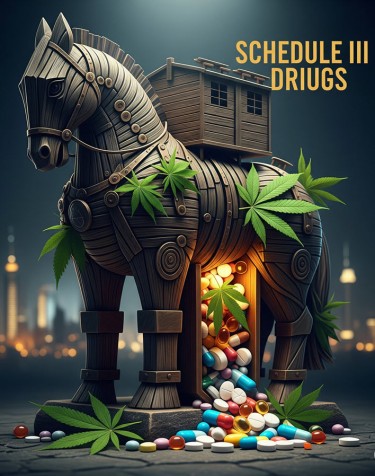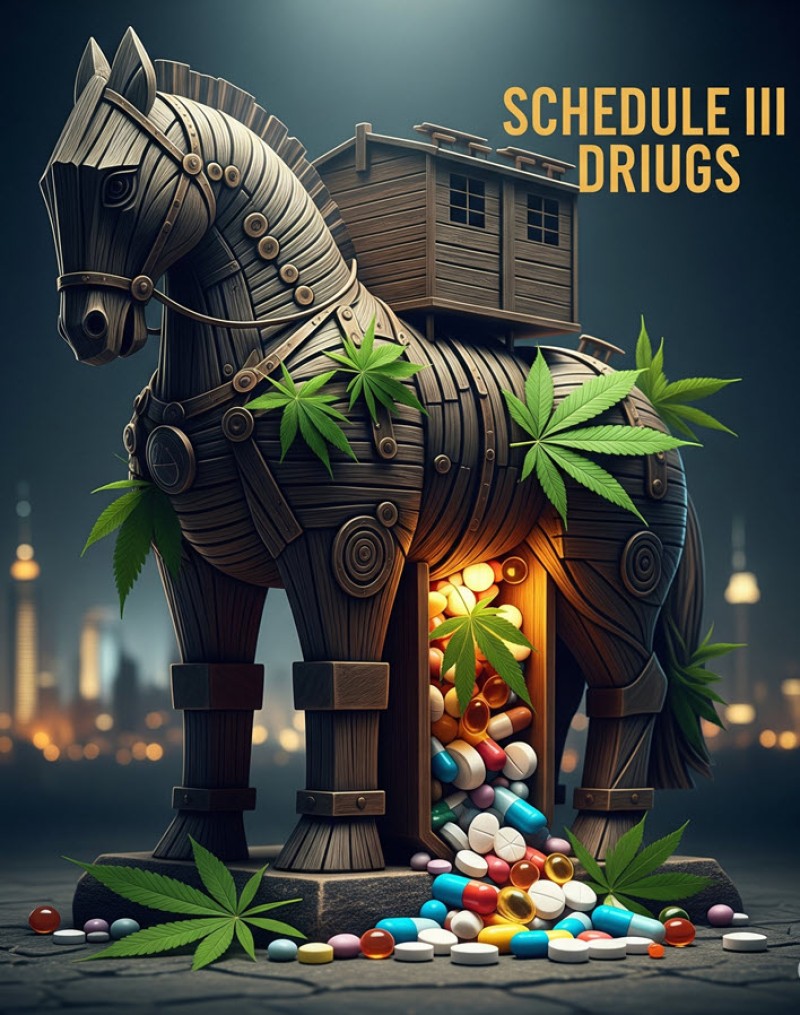
President Trump's recent comments about "looking at" marijuana rescheduling have sent cannabis advocates into a frenzy of misplaced optimism, flooding my inbox with headlines proclaiming that Trump is "considering cannabis reform." But before anyone starts celebrating, let's be crystal clear about what's actually on the table: Schedule III rescheduling - a half-measure that would hand cannabis over to Big Pharma on a silver platter while leaving millions of Americans still criminalized for using a plant that's safer than aspirin.
The fact that Trump made these comments at a $1 million-a-plate fundraising dinner attended by Trulieve CEO Kim Rivers should tell you everything you need to know about whose interests are being served. This isn't about criminal justice reform or individual liberty - it's about corporate capture of the cannabis industry by the same pharmaceutical monopoly that has been profiting from prohibition for over 50 years.
Schedule III isn't cannabis reform - it's cannabis corporate welfare disguised as progress. While Bob Barr and other establishment conservatives promote this "compromise" as sensible policy, they're either ignorant of the implications or deliberately misleading the public about what Schedule III actually accomplishes. The only rational approach to cannabis policy is complete removal from the Controlled Substances Act, treating cannabis like alcohol and allowing free market competition instead of government-sanctioned monopolies.
The real question isn't whether Trump will reschedule cannabis - it's whether the American people will be fooled into accepting corporate cannabis control instead of demanding actual freedom. After 50+ years of the War on Drugs serving as Big Pharma's protection racket, Schedule III represents their backup plan to maintain control when prohibition becomes politically unsustainable.
Don't let them rebrand corporate capture as cannabis reform. The people want full legalization, not pharmaceutical industry bailouts wrapped in reform rhetoric.
The Schedule III Scam: Big Pharma's Cannabis Bailout
To understand why Schedule III is a disaster for cannabis freedom, you need to understand what the Controlled Substances Act actually accomplished when Nixon signed it in 1971. The CSA wasn't just about criminalizing drugs - it was about creating a government-enforced monopoly that handed all drug manufacturing, development, and distribution to pharmaceutical companies while using the DEA as their private enforcement army.
Before 1971, anyone could manufacture and sell pharmaceuticals in America. The CSA changed that by requiring special licenses for drug production that only established pharmaceutical companies could obtain. Suddenly, natural medicines that people had used for thousands of years became "controlled substances" that only licensed corporations could legally provide.
Cannabis prohibition was never about public safety - it was about eliminating competition for pharmaceutical products that treat the same conditions. Why would someone buy expensive prescription painkillers, anti-anxiety medications, or sleep aids when they could grow effective medicine in their backyard? The CSA solved this problem by making backyard medicine production a federal crime punishable by decades in prison.
Schedule III maintains this monopoly structure while appearing to provide reform. Under Schedule III, cannabis would remain a controlled substance requiring DEA registration and FDA approval for all products. Only companies with millions of dollars and teams of regulatory lawyers could navigate the approval process, effectively excluding small businesses, craft cultivators, and medical patients from participating in legal cannabis markets.
The "medical research" benefits that Schedule III supporters tout would primarily benefit pharmaceutical companies developing patentable cannabis-derived medications, not patients seeking whole-plant medicine or consumers wanting access to natural products. When Barr writes about "therapeutic breakthroughs," he's describing pharmaceutical company profits, not patient access to affordable medicine.
Meanwhile, the 440,000 existing cannabis jobs that Barr mentions would largely disappear as pharmaceutical companies take over production and distribution. Schedule III would eliminate the diverse, entrepreneurial cannabis industry that states have built in favor of corporate monoculture that treats cannabis like any other pharmaceutical product.
The banking access and reduced regulatory burden that Schedule III might provide would primarily benefit large corporations rather than small businesses that currently face these challenges. Multi-State Operators and publicly-traded cannabis companies have the resources to navigate federal regulations; mom-and-pop dispensaries and craft cultivators don't.
Trump's Corporate Cannabis Donors Speak Volumes
The context surrounding Trump's cannabis comments reveals everything about whose interests are driving this policy discussion. When a president discusses cannabis policy at a $1 million-a-plate fundraiser attended by major cannabis industry CEOs, he's not talking about criminal justice reform or individual liberty - he's negotiating corporate welfare with potential donors.
Trulieve, whose CEO attended the dinner where Trump made his cannabis comments, contributed $250,000 to a cannabis industry PAC that donated $1 million to Trump's MAGA Inc. super PAC. This same PAC spent $120,500 on "legal services" from a firm associated with Trump that conducted polling showing Republican support for cannabis reforms. This isn't grassroots advocacy - it's corporate lobbying disguised as public opinion research.
The Scotts Miracle-Gro owner who claims Trump has told him "multiple times" that he intends to pursue rescheduling represents another corporate interest that would benefit from Schedule III. Gardening supply companies make enormous profits from cannabis cultivation equipment, and federal rescheduling would legitimize and expand their market without threatening their oligopoly position.
These corporate donors aren't advocating for cannabis freedom - they're advocating for corporate cannabis control that eliminates competition while maintaining high profit margins. Schedule III serves their interests perfectly by creating barriers to entry that protect established players while appearing to provide reform.
The $1 million-a-plate price tag for access to Trump's cannabis policy discussions demonstrates how far removed this process is from public input or democratic decision-making. Working-class Americans who've been arrested for cannabis possession can't afford to influence policy at those price points, but pharmaceutical executives and cannabis industry CEOs can.
When policy discussions happen at private fundraisers attended by industry executives, you're witnessing corporate capture in real-time. The "reform" being discussed serves donor interests, not public interests, regardless of how it's marketed to voters.
The Real American Solution: Complete Descheduling
The only cannabis policy consistent with American values of individual liberty, free market competition, and limited government is complete removal from the Controlled Substances Act. Cannabis should be regulated like alcohol - controlled for age and impaired driving, but otherwise treated as a legal consumer product that adults can produce, sell, and consume without federal interference.
Descheduling would immediately eliminate the federal monopoly structure that has enriched pharmaceutical companies while impoverishing communities affected by prohibition. Instead of requiring expensive federal licenses and FDA approval processes, cannabis businesses could operate under state and local regulations just like breweries, wineries, and distilleries.
Medical patients would gain access to whole-plant medicine without prescription requirements or pharmaceutical company markup. They could grow their own medicine, purchase from local producers, or access products from anywhere in the country without federal criminal liability.
The free market would determine cannabis product quality, pricing, and innovation rather than federal bureaucrats protecting pharmaceutical company profits. Consumers could choose between craft cannabis from small producers and mass-market products from large companies based on quality and price rather than regulatory capture.
Criminal justice resources currently wasted on cannabis enforcement could focus on actual crimes that harm others. The millions of Americans with cannabis arrests on their records could have those convictions automatically expunged without requiring expensive legal processes.
International competitiveness would improve as American cannabis companies could compete globally without federal restrictions that handicap them compared to Canadian, European, and other international competitors who don't face prohibition constraints.
Tax revenue would flow to state and local governments that actually provide services to their communities rather than federal agencies that primarily serve pharmaceutical industry interests. States could design cannabis taxation and regulation systems that reflect their citizens' preferences rather than federal bureaucrats' priorities.
Most importantly, descheduling would restore the constitutional balance between federal and state authority that prohibition has distorted for decades. States could choose their own approaches to cannabis policy without federal interference, allowing policy experimentation that serves diverse communities' needs.
The Establishment's False Choice
The cannabis policy debate has been artificially constrained to a false choice between continued prohibition and pharmaceutical industry control through rescheduling. Establishment voices like Bob Barr present Schedule III as the only "sensible" alternative to current policy, ignoring the obvious third option of treating cannabis like any other legal consumer product.
This false choice serves corporate interests that profit from both prohibition and controlled legalization while excluding the public interest in actual freedom. Prohibition generates profits for private prisons, law enforcement contractors, and pharmaceutical companies selling competing products. Schedule III generates profits for pharmaceutical companies developing cannabis medications while maintaining barriers that prevent competition.
Neither option serves the American people who overwhelmingly support cannabis legalization and want the freedom to make their own choices about cannabis consumption without government interference. Polling consistently shows that Americans want cannabis treated like alcohol, not like a pharmaceutical product requiring prescriptions and federal oversight.
The establishment's insistence on maintaining federal control reflects institutional resistance to admitting that prohibition was wrong and that government control over consciousness is fundamentally illegitimate. They'd rather transfer control from one bureaucracy to another than acknowledge that adults should be free to make their own choices about consciousness-altering substances.
Conservative support for Schedule III represents a particularly disappointing betrayal of limited government principles. When conservatives advocate for federal control over plant cultivation and consumption, they're abandoning the constitutional constraints and individual liberty principles that supposedly define their movement.
The fact that Schedule III is being promoted as "conservative" policy reveals how thoroughly corporate interests have captured both parties' policy processes. Real conservative policy would eliminate federal drug scheduling entirely and restore constitutional limits on federal authority over state and individual decisions.
The Sticky Bottom Line: Demand Real Freedom, Not Corporate Cannabis
Trump's consideration of cannabis rescheduling represents a corporate capture opportunity disguised as reform, and cannabis advocates need to recognize the difference between progress and propaganda. Schedule III isn't a step toward freedom - it's a step toward pharmaceutical industry control that would eliminate the diverse, innovative cannabis industry that state legalization has created.
The timing and context of Trump's comments - at million-dollar fundraisers attended by cannabis industry executives - reveals that this policy discussion is about corporate interests, not public interests. When cannabis CEOs pay for access to influence policy, they're not advocating for criminal justice reform or individual liberty; they're seeking regulatory advantages that eliminate competition.
Bob Barr's conservative case for Schedule III ignores the fundamental question of whether the federal government should control plant cultivation and consumption at all. Real conservative policy would eliminate the CSA entirely and restore constitutional limits on federal authority, not transfer control from one federal bureaucracy to another.
The American people deserve better than a choice between prohibition and pharmaceutical industry control. They deserve the freedom to grow, produce, sell, and consume cannabis just like any other agricultural product, subject only to reasonable age restrictions and impaired driving laws.
Cannabis advocates should reject the false choice between prohibition and Schedule III, demanding complete descheduling that treats cannabis like alcohol rather than like a pharmaceutical product. Anything less represents continued acceptance of government control over consciousness and corporate welfare for pharmaceutical companies.
The cannabis freedom movement didn't spend decades fighting prohibition to hand control over to Big Pharma through the backdoor of rescheduling. Real reform means ending federal cannabis control entirely, not transferring it to different corporate masters.
Don't let Trump, Barr, or anyone else convince you that pharmaceutical industry control represents progress. The only acceptable cannabis policy is complete freedom - the right to grow, possess, and consume cannabis without federal interference.
Demand descheduling, not rescheduling. Demand freedom, not corporate cannabis control. The American people deserve nothing less than the complete end of cannabis prohibition.






